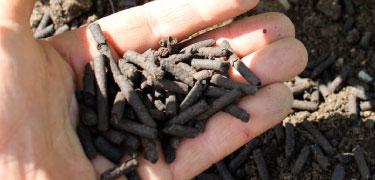


Plants are given plant feed to help them grow stronger and healthier. This is to increase yields and give a healthier appearance to foliage and flowers. In many cases a plant does not require regular feeding and in some cases not at all. Sometimes feeding the soil is all that is needed as young plants can easily access the nutrients from the ground. Fruit and vegetables benefit greatly from a regular feed, if you think about all the nutrients and vitamins they provide us, they have to get them from somewhere. Plants grown in pots, containers, and planters will need more feeding than those directly in the soil (Beds, borders, garden). Plant feed can be given throughout the growing season but should only be applied if required. If plants are appearing weak and not growing as expected; showing less leaves, flowers, fruit etc, displaying signs of a lack of nutrients, and where all the other conditions are favourable then they are in dire need of some plant food.
Plant feed and fertilizers play a huge part in the garden and here at Quickcrop we only use natural and organic alternatives. Growing fruit and vegetables takes a lot of nutrients out of a garden's soil, and after they have grown and been harvested very little of these valuable elements remain. Artificial feeds are water soluble so that they are quite fast acting, as a result a lot of the soluble nutrients contained within wash far too quickly through the soil. Those nutrients don't get used by plants and end up being wasted. Most of these types of plant feed have a limited focus that doesn't extend beyond the major nutrients: nitrogen, phosphorous and potassium (N.P.K). Organic plant feeds contain a large mix of micro nutrients with essential minerals and the trace elements that young plants need to grow stronger and be able to better withstand the elements or disease. While chemical based plant feed does work well, it is a short term solution and a good natural alternative feed works better for longer. Feeding our plants in such an organic way also feels better and safer in the vegetable garden as we tend to eat the end result. It is a well fed and looked after soil that will support healthier plants without requiring more feeding throughout the season. Feeding plants and soil with a natural feed is much easier for the home gardener as it is hard to go wrong. Chemical feeds can damage the soil and whatever is growing in it if applied incorrectly, this is why we always advise new gardeners to use organic plant food.
Seaweed is one of the best natural feeds you can give to your garden, it provides lasting benefits for both soil and plants. A good seaweed based feed will contain all the major plant nutrients as well as a whole range of micro nutrients often absent in old and tired soil. It contains naturally occurring growth stimulants as well as a very broad range of essential minerals and trace elements which are used in the growth of strong, healthy plants. Seaweed plant feed promotes stronger root growth and stimulates the microbial life in the soil which makes more nutrients available to plants. These natural feeds will also strengthen the plants immune system helping to fight off bacterial and fungal attack. A few years ago we created our own brand of seaweed fertilizer called Seafeed, we use collected seaweed that washes up on the shore (I think it is illegal to go out and cut it). This is then processed with some chicken manure into a pellet form for easier use. this range was designed to help achieve maximum results in the vegetable garden.
The best place to start is down in the ground. Soil is the foundation of any vegetable garden and the healthier the soil; the stronger those foundations will be. Start with your existing soil by performing a quick soil test to see what you are working with. A pH soil test kit will very quickly point out the pH level of your soil (acid & alkaline levels). Once you have this you can easily determine what will grow best in a given area, or what to add to the soil in order to grow other plants and vegetables. Adding compost for extra alkaline or ground limestone for added acid will change the soil's pH to the required levels. We supply all manner of soil testers, fertilizers, and composts. Of course fruit and vegetables can be grown in poor quality soil if enough soil improvers are added but the quality of the soil will only dwindle until it is useless for growing in. We always recommend using a natural, organic compost (making your own is very easy and the quality will be perfect), and we also stock a selection of natural soil improvers and conditioners as well as compost accelerators.